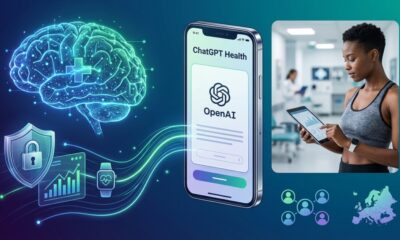Healthcare
VR Could Help Detect ADHD in Children

A team of researchers has used virtual reality (VR) games, eye tracking and machine learning to demonstrate how differences in eye movements can be used to detect ADHD. The new approach could be used for ADHD therapy and to assess other conditions like autism.
The team consisted of researchers from Aalto University, the University of Helsinki, and Åbo Akademi University. They developed a VR game called EPELI that can be used to assess ADHD symptoms in children by simulating situations form everyday life.
The research was published in the journal Nature.
EPELI Virtual Reality
The new approach tracked the eye movements of children in a VR game, and machine learning helped spot differences in those with ADHD. The study included 37 children diagnosed with ADHD and 36 children that made up the control group. They played EPELI and a second game called Shoot the Target, where the player is instructed to locate objects in the environment before “shooting” them by looking at them.
Lisa Merzon is a doctoral researcher at Aalto University.
“We tracked children’s natural eye movements as they performed different tasks in a virtual reality game, and this proved to be an effective way of detecting ADHD symptoms,” Merzon said. “The ADHD children’s gaze paused longer on different objects in the environment, and their gaze jumped faster and more often from one spot to another. This might indicate a delay in visual system development and poorer information processing than other children.”
Juha Salmitaival is project lead and an Academy Research Fellow at Aalto.
“This isn’t just a new technology to objectively assess ADHD symptoms. Children also find the game more interesting than standard neuropsychological tests,” he says.
Salmitaival, Professor Matti Laine from Åbo Akademi University, and Erik Seesjärvi, a doctoral researcher at the University of Helsinki and clinical neuropsychologist a Helsinki University Hospital (HUH) worked together to come up with EPELI. The game is available to neuropsychologists working in pediatric neurology and pediatric psychiatry at HUH.
“Those who are interested can use EPELI as an aid in their clinical work,” Seesjärvi says. “The experience has been very positive. All of the neuropsychologists who answered a feedback survey after the first pilot said they had benefited from using virtual reality methods as a complementary tool in their work.”
Topi Siro, an Aalto alum who works at Peili Vision Oy, led the game development for EPELI.
“The game provides a list of tasks that simulate everyday life, such as brushing your teeth and eating a banana,” Siro said. “The player has to remember the tasks despite distractions in the environment, such as a TV being on. The game measures everything: how much the child clicks on the controls and how efficiently they perform the tasks. Efficiency correlates with everyday functioning, whereas children with ADHD often have challenges.”
Therapeutic Applications of VR Games
The team believes that there are a broad range of therapeutic applications for VR games.
“We want to develop a gamification-based digital therapy that can help children with ADHD get excited about doing things they wouldn’t otherwise do,” Salmitaival says. “There’s already an approved game for ADHD rehabilitation in the US. The team is exploring rehabilitation possibilities in a project with researchers at the University of Oulu.”
Linda Henriksson is a senior lecturer at Aalto University. Also involved in the study, she has high hopes for VR games and such applications.
“I see virtual reality as an interesting tool, because it can be used to precisely control what happens in the stimulus world while at the same time collecting information about behavior in a natural situation,” she says.
EPELI could also be used to measure problems in the planning and flexibility of activities in people with autism. Any by modifiying the system, it could be used to assess language problems, brain trauma, adult ADHD, and more.












